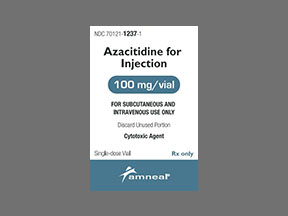Azacitidine, also known as Vidaza, is a chemotherapy medication used to treat certain blood disorders, specifically myelodysplastic syndromes (MDS) in adults and juvenile myelomonocytic leukemia (JMML) in children aged one month and older. It can also be prescribed off-label for acute myeloid leukemia (AML). This drug helps the bone marrow produce healthy blood cells and eliminates abnormal cells that proliferate too rapidly and function improperly.
Administered by a healthcare professional as an injection either under the skin or into a vein, Azacitidine is typically given daily for one week each 28-day cycle. Common side effects may include nausea, fever, and constipation.
Azacitidine works by addressing the issue where immature blood cells in MDS and JMML do not mature properly, resulting in an excess of immature cells and a deficiency of mature red and white blood cells. It is crucial to consult your healthcare provider to ensure this treatment is safe and suitable for your condition.
Our coupons are free to use. Before paying, show the pharmacist your Azacitidine savings card to get your free discount. Use our filters below to edit the prescription box to match your needs. The Azacitidine prices will update based on your prescription needs. Above our Azacitidine coupons, you can change your location to see pharmacy prices and costs in other areas. We're here to help you buy Azacitidine at the lowest price with our prescription discount card.
My prescription
Edit
100MG, Azacitidine (10 Suspension Reconstituteds)
Select pharmacy

CVS
$1391.50
COUPON PRICE
Albertsons
$144.50
COUPON PRICE
Walgreens
$146.20
COUPON PRICE
Walmart
$1299.50
COUPON PRICEAzacitidine savings card
Show this card to your pharmacist
Albertsons
$144.50
BIN
ID
PCN
GRP
015995
LHKPY240295
GDC
DR33
Powered by
Azacitidine, also known as Vidaza, is a chemotherapy medication used to treat certain blood disorders, specifically myelodysplastic syndromes (MDS) in adults and juvenile myelomonocytic leukemia (JMML) in children aged one month and older. It can also be prescribed off-label for acute myeloid leukemia (AML). This drug helps the bone marrow produce healthy blood cells and eliminates abnormal cells that proliferate too rapidly and function improperly.
Administered by a healthcare professional as an injection either under the skin or into a vein, Azacitidine is typically given daily for one week each 28-day cycle. Common side effects may include nausea, fever, and constipation.
Azacitidine works by addressing the issue where immature blood cells in MDS and JMML do not mature properly, resulting in an excess of immature cells and a deficiency of mature red and white blood cells. It is crucial to consult your healthcare provider to ensure this treatment is safe and suitable for your condition.
Our coupons are free to use. Before paying, show the pharmacist your Azacitidine savings card to get your free discount. Use our filters below to edit the prescription box to match your needs. The Azacitidine prices will update based on your prescription needs. Above our Azacitidine coupons, you can change your location to see pharmacy prices and costs in other areas. We're here to help you buy Azacitidine at the lowest price with our prescription discount card.
More prescriptions for myelodysplastic syndromes
coupons from$99.90Save 84%
coupons from$3598.03Save 82%
coupons from$2493.49Save 72%
coupons from$3598.03Save 82%
More prescriptions for myelodysplastic syndromes
Imatinib Save 84%coupons from $99.90
Revlimid Save 82%coupons from $3598.03
Imkeldi Save 72%coupons from $2493.49
Lenalidomide Save 82%coupons from $3598.03
Azacitidine dosage forms
Use our Azacitidine 100MG coupon with prices from $266.70 for 10 Suspension Reconstituteds. You can also use our Azacitidine 100MG coupon with prices from $33.42 for 1 Suspension Reconstituted.
Dosage Quantity Price from Per unit 100MG 10 Suspension Reconstituteds $266.70 $26.67 100MG 1 Suspension Reconstituted $33.42 $33.42
| Dosage | Quantity | Price from | Per unit |
|---|---|---|---|
| 100MG | 10 Suspension Reconstituteds | $266.70 | $26.67 |
| 100MG | 1 Suspension Reconstituted | $33.42 | $33.42 |

